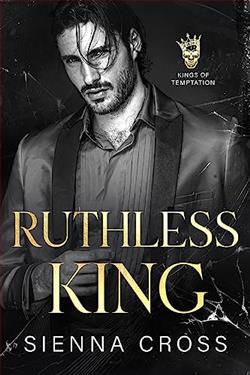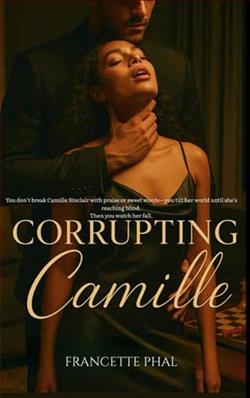Page 20 of All Good People Here
“At first, we all rallied behind them like you wouldn’t believe. I bet they had enough casseroles to last a lifetime. Their front stoop turned into a January shrine—flowers, balloons, framed pictures of her. I brought a teddy bear because I thought, you know, it’d be nice for her to have, wherever she’d gone.”
Linda’s eyes grew glassy. Too-early deaths did that to people. They didn’t just rob children of their lives; they robbed them of their futures. Alive, they could grow up to become famous dancers or hard-hitting reporters. Dead, they turned into nothing but lost potential.
“But it wasn’t long before the town turned on them,” Linda went on. “And it all started when they went on TV. Krissy was—well, I’m sorry, but she was just not acting normal, not like a grieving mother. She would just stare off into space, her knuckles white on little Jace’s shoulder. And then people started to talk. Krissy always wanted to be a dancer—that was no secret—and here her little girl was winning competitions at the age of six. She was more successful than Krissy had ever been or would ever be. At the rate she was going, January could’ve been famous. And everyone knows jealousy is a powerful motivator. So that’s when people around here started to be not so nice to them.”
“Sorry,” Margot said, “but it kind of sounds like you thinkKrissykilled January.”
“Oh!” Linda’s eyebrows shot up high on her forehead. “Gosh. No.Idon’t think Krissy killed her little girl. I’m just saying what people were thinking back then. Isn’t that what you asked?Ithink whoever took little Natalie Clark took January too. It’s what I’ve always thought, that she was killed by some…intruder. Some bad man traveling through.”
Margot had to fight to keep her face neutral. It was revisionist history at its most clumsy. Luke had been right the other morning. The locals had turned on the Jacobs family and now were feeling guilty.
Linda continued. “I mean, why else would there’ve been all that broken glass?”
Despite the jump in topic, Margot understood what Linda was talking about: the supposed way the intruder had come into the Jacobs house. When the police visited their home on the morning of January’s disappearance, they’d found one of the basement windows smashed in, glass littering the floor.
“I think,” Linda said, “an intruder punched in that window, came in through the basement, and grabbed January from her bed. I don’t know what he’s been doing in the meantime, but by the looks of it, now he’s back.”
Just then, the front door opened and both women turned to watch a family of four walk in. Behind them was a train of others. Linda had not been exaggerating about the after-church-event swarm. “Shoot,” she said. “It’s time.”
Margot nodded. “Right, of course. Thank you.” Linda got up and started walking toward the front, but turned when Margot called her back. “Hey, Linda, would you mind spreading the word about what I’m doing? That I’m a reporter and if anyone wants to talk, they can find me here?”
Linda grinned, and Margot could tell she’d won the waitress over. In her experience, everyone wanted the same thing:someone to listen while they talked. “Sure thing, hon,” Linda said, and just before she turned back to the front, she threw Margot a wink.
—
Word quickly got around that the Davies girl, a reporter from Indianapolis, was in town conducting interviews about the Natalie Clark and January Jacobs cases. And just as Linda had said, all the locals seemed to believe the perpetrator of both crimes was one and the same. Subsequently, they also believed the Jacobs family was innocent. Within twenty-four hours, the sentiment of the town seemed to have done a one-eighty. But it also seemed this change of heart had been so swift that people were having a hard time keeping up. Like Linda, even as they voiced their newfound support of the Jacobses, they still managed to cast suspicion on them—or rather, on Krissy. Though both Luke and Pete had said the town had turned on the entire Jacobs family, it seemed to Margot most of their ill will now was targeted at January’s mom.
“Krissy was undeniably jealous of January,” one woman told Margot. “Because of her dance stuff and all the attention people lavished on her. But of course, I don’t think she’d evermurderbecause of that.”
“Krissywasjealous of January,” the town’s butcher agreed. “But it wasn’t because of dance. She couldn’t handle knowing that Billy loved January more than he loved her. So people used to suspect that had something to do with the murder. But of course, now they know better.”
“Billy and Krissy got married when they were eighteen,” said one woman whom Linda introduced as her best friend. “And January and Jace came along not much later. Could’ve been nine months, but I wouldn’t be surprised if it was less. They were babies raising babies! And Krissy couldn’t handle a family. So some people thought that maybe, you know, she murdered January toescape motherhood, but chickened out before she could get to Jace.”
“Krissy was absolutely an unfit mother,” the Sunday school teacher told her. “Just look at Jace—alwaysgetting in trouble. I don’t think that had anything to do with poor January’s death, but I do think you should know the full picture.”
After she’d thanked the teacher for her time, Margot finished jotting down a few notes, headed to the bar to place her to-go order for lunch, then slipped out the door. The bright light outside was a sharp contrast to the dim interior of the restaurant, and she leaned back against the front of the building, rubbing her eyes. When she opened them again, a movement—a figure across the street—caught her gaze. It was a woman, in a white T-shirt and loose-fitting jeans, probably in her midforties with what looked to be dyed auburn hair. It hung lanky and unwashed over her shoulders. Something about the way she darted her gaze away from Margot’s made the hair on Margot’s arms stand up. Had she been watching her?
Before she had a chance to do anything, though, the door to Shorty’s opened and Linda poked her head out. “Margot—oh sorry, hon, didn’t mean to scare you,” she said when Margot jumped. “Just wanted to let you know your food’s ready.”
“Thanks,” Margot said hastily, desperate to return her gaze across the street. “I’ll be in in a sec.”
Linda disappeared inside, and Margot turned back to where she’d caught the woman watching her. But the woman had vanished.
NINE
Krissy, 1994
Krissy paced the small room at the police station while Detective Lacks sat by the rickety metal table and pretended not to be keeping an eye on her. In front of the detective were two untouched Styrofoam cups of coffee, damp napkins curling around their bases, a token offering of comfort while they waited.
Half an hour earlier, Krissy had been telling the detective her most concrete theory about what had happened to January. She knew, after overhearing Lacks and Townsend outside, that she needed to narrow her focus to just one, and when she thought of the broken basement window and those unnerving words on her kitchen walls, the most obvious explanation in her mind was that it had all been done by an intruder with a personal connection to her daughter. An unstable, lecherous man who took whatever he wanted—that’swhat Krissy would think if she were a detective on the case. She put together a list of faces in her mind, cataloging all the men she’d ever been wary of at January’s dance competitions: one man, who wore polo shirts buttoned to his neck and watched the performances with a wolfish look in his eyes; another guy, junkie skinny and balding, who hung around the hallways wherethe girls flitted between performances. Krissy wanted them arrested, interrogated with a taser.
Halfway through the interview, though, Townsend interrupted with the announcement that their team had found the dead body of a little girl, discarded in a ditch less than two miles from their home. The detective had escorted Billy to the morgue to identify the body, but Krissy knew this was a mere formality. She knew, deep in her bones, that the little girl was January. Of course it was; they lived in a town of less than two thousand people and January was the only one who was missing.
A sudden movement from beyond the window caught Krissy’s attention and she watched as Detective Townsend and Billy appeared through the glass double doors of the police station. Sure enough, in the moment she saw her husband—his eyes red-rimmed, his body strangely slack—Krissy knew she’d been right.
And yet, the confirmation of it still felt like she’d been shot in the stomach. Disjointed thoughts tumbled through her brain.Not my baby.AndWhere’s Jace?AndI need to act how they expect me to act.Then Townsend and Billy were in the room with them and Townsend’s mouth was moving, but Krissy couldn’t make out what he was saying. Her body was thrumming, the edges of her vision beginning to blur and blacken. Suddenly, the two detectives were beside her, Townsend pulling out a chair, Lacks’s hands on her elbows as she guided her into it. In the moment the detectives were distracted, Krissy lifted her eyes to meet her husband’s and saw that Billy was gazing down at her with—what? Fear? Disgust? It crawled up her back like spiders. And then it was gone. She slumped into the chair and buried her face in her hands.
“Mrs. Jacobs, Mr. Jacobs,” Krissy heard Detective Townsend say. She blinked and realized some time had passed. Billy was now sitting next to her. In front of them were two untouched cups of what looked like tea. Her body, Krissy noticed, felt a little steadier. She forced herself to look at the detective.















